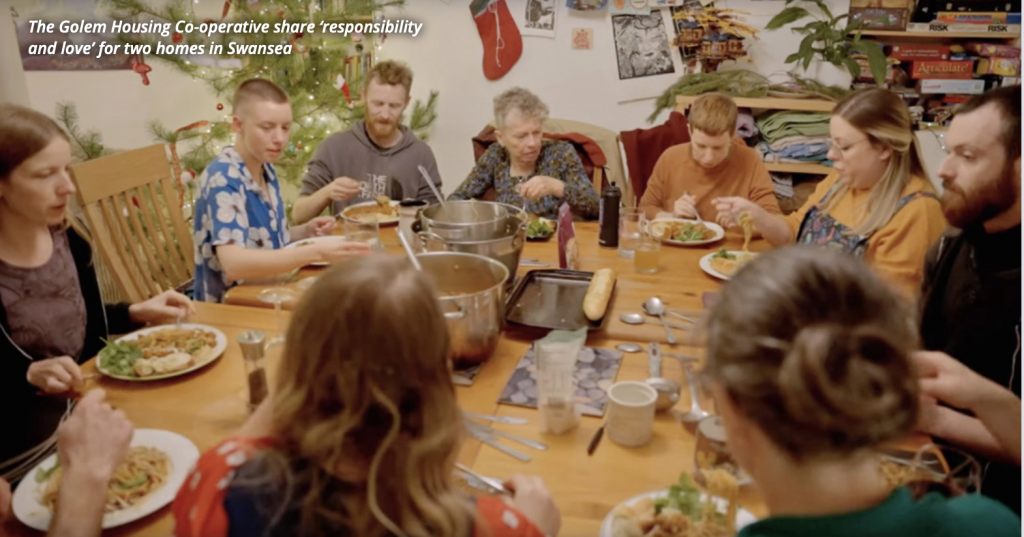A new project aims to give young people a voice and a choice in the battle to end homelessness, says Kath Griffiths.
 At the end of November I was invited to represent Cwmpas’ Communities Creating Homes team at the Working Together to Address Youth Homelessness conference in Llandrindod, Powys. The conference – organised by the network of youth homelessness co-ordinators from each of Wales’ local authorities – brought together youth workers, housing professionals and other stakeholders with the aim of highlighting common themes, sharing good practice and agreeing on proactive measures to tackle youth homelessness and its underlying causes.
At the end of November I was invited to represent Cwmpas’ Communities Creating Homes team at the Working Together to Address Youth Homelessness conference in Llandrindod, Powys. The conference – organised by the network of youth homelessness co-ordinators from each of Wales’ local authorities – brought together youth workers, housing professionals and other stakeholders with the aim of highlighting common themes, sharing good practice and agreeing on proactive measures to tackle youth homelessness and its underlying causes.
At this point you may be wondering how the work we as a team do fits into the youth homelessness agenda. Community-led housing is by no means a quick fix, and it probably wouldn’t make it into your crisis management toolkit. But this isn’t your average crisis. In 2022-23 12,537 households in Wales were assessed as homeless, with the number of households in temporary accommodation at its highest since the introduction of the Housing (Wales) Act 2014[1]. Here in my home region of the North, Gwynedd saw a staggering 48 per cent rise in homelessness between 2019-20 and 2021-22[2].
With the full impact of high interest rates on homeowners and the private rented sector as yet unknown, it’s likely there’s worse to come. Perhaps then, community-led housing – by its nature hyperlocal, needs-driven and innovative – has a part to play after all.
With this in mind, Communities Creating Homes has been working closely with one of North Wales’ youth homelessness co-ordinators to explore whether a housing co-operative model could offer young people with low support needs an alternative to supported accommodation in cases deemed appropriate within the Housing (Wales) Act 2014 and the 2023 white paper on ending homelessness in Wales. We are keen to test whether it could provide a breaker in the circuit where the employment opportunities of some young people in supported accommodation are limited by the risk of accruing arrears when support costs are no longer covered by housing benefit or equivalent, but where unemployment puts them in a disadvantaged position for accessing move-on accommodation in the private rented sector.
We wonder whether it could also be an option for move-on itself. At a time when one-bed homes are in such high demand and short supply, perhaps it could offer an alternative to flying solo whilst at the same time equipping young people with the skills and networks conducive to ensuring homelessness is unrepeated.
So how might it work?
Applying a housing co-operative model to youth homelessness
First of all, what is a housing co-operative?
It is a group of people who live together and manage their home in a democratic way by making decisions jointly and taking collective responsibility for rent, bills and sometimes maintenance. Members usually have their own bedrooms and share facilities like the bathroom and kitchen. But this is more than your average house share. With Communities Creating Homes on hand for advice and support, members establish themselves as a legal entity (co-operative society), which enables them to enter into agreements or contracts with, for example, a landlord or utility provider as a collective. Accordingly, members’ individual financial contributions towards rent and bills are paid into a central bank account and paid out in the co-op’s name.
A useful example from Wales is Golem Housing Co-operative, a group of 13 people who share ‘responsibility and love’ for two homes in Swansea. Its website (which also includes an insightful video about the group and the wider co-op movement on its homepage) states that they ‘all find common ground which allows us to come together cohesively to live, work, socialise and support each other’[3]. What better outcome could we strive for?

Now is a good time to say we fully appreciate that the levels of commitment and responsibility becoming a member of a housing co-operative requires may not appeal to or be appropriate for all young people experiencing or at risk of homelessness, and we are in no way advocating the model for anyone but those with the lowest support needs. Nevertheless, we are keen to explore whether a flexible approach could offer the best of both worlds as follows:
1) Targeted support – Let’s say a group of young people for whom the model is appropriate is brought together by the youth homelessness co-ordinator and other relevant parties using a decision matrix designed with sensitivity to the co-operative values of democracy and equity. Guidance is offered by Communities Creating Homes to foster cohesion and facilitate decisions around what is important to the group, which aspects of their home they want to be responsible for, and where they may need additional support. A package of ongoing training and mentoring is delivered by statutory and non-statutory services (organised according to local context) to enable the young people to ‘champion’ certain aspects of their living arrangements, for example, budgeting, recycling or mental health.
2) Personal and collective responsibility – Even if members’ eligibility for housing benefit or the housing element of Universal Credit complicates the collective payment of rent, the group might choose to enter into contracts as individuals whilst still applying the co-operative model to the purchase of utilities and groceries, plus activities such as cooking, cleaning and gardening.
Including young people in the solution to homelessness
The finer details of how this ‘best of both worlds’ approach could work in practice – including the question of how it might be funded – are of course dependent on local context, both strategic and operational, but we are making promising progress in North Wales that suggests a pilot project could launch in 2024.
This fills us with hope as, for a generation that has already lost so much through the pandemic and multiple other global crises, the potential benefits are remarkable. At the same time as co-ordinating a robust support package pitched at an appropriate level, the model promotes active engagement and collective responsibility, giving young people experiencing or at risk of homelessness a voice and a choice in developing a solution that works for them.
A housing co-operative can be a space where learning and skills-development blossom, which could play a significant role is setting young people up to successfully transition to education, employment or training as well as to social housing, the private rented sector and perhaps eventually homeownership – either as individuals or as a collective.
Want to know more? The Communities Creating Homes team would love to hear from you! Contact us at co-op.housing@cwmpas.coop.
Kath Griffiths is a community-led housing enabler within the Communities Creating Homes team at Cwmpas
[1] Homelessness: April 2022 to March 2023 | GOV.WALES
[2] Second homes behind homelessness rise in Gwynedd, report says – BBC News